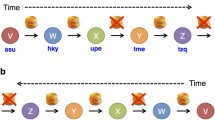Abstract
Anthropologists and sociologists have long emphasized the concept of generalized reciprocity and symbolic value of gifts. When gifts are given in primitive or modern societies, symbolic meanings of gifts are taken into account and the gift recipients feel obliged to return the favor. In the field of economics, several papers in recent years have emphasized the value of gifts as signaling toools or as expressions of altruism. However, these papers do not address the issue of symbolic value of gifts. This paper discusses how symbolic value of a gift can be determined and how it is related to the concept of generalized reciprocity. A Nash game is used to show how symbolic values may be determined in a model of generalized reciprocal gifts.
Similar content being viewed by others
References
Andreoni, J. “Impure Altruism and Donations to Public Goods: A Theory of Warm-Glow Giving,”The Economic Journal, 100, 1990, pp. 464–77.
Bowles, S.; Herbert, G. “Origins of Human Cooperation,” chapter fromGenetic and Cultural Evolution of Cooperation, edited by P. Hammerstein, The MIT Press, Boston: Mass, 2003.
——. “Homo Reciprocans: Altruistic Publishment of Free Riders,”Nature, 415, 10, 2002, pp. 125–28.
Camerer, C. “Gifts as Economic Signals and Social Symbols,”American Journal of Sociology, 94, 1988, S180-S214.
Carmichael, H. L.; Macleod, W. B. “Gift Giving and the Evolution of Cooperation,”International Economic Review, 38, 3, 1997, pp. 485–509.
Ernst, F.; Gächter, S. “Fairness and Retaliation: The Economics of Reciprocity,”Journal of Economic Perspectives, 14, 2000, pp. 159–81.
Gouldner, A. “The Norm of Reciprocity,”American Sociological Review, 25, 1960, pp. 161–78.
Henry, O.The Gift of the Magi and Other Short Stories, New York: Dover Publications, 1992.
Khalil, E. “Symbolic Products: Prestige, Pride, and Identity Goods,”Theory and Decision, 49, 1, August 2000, pp. 53–77.
Kolm, S. C. “The Logic of Good Social Relations,”Annals of Public and Cooperative Economics, 71, 2, June 2000, 171–89.
Malinowski, B.Argonauts of the Western Pacific, Routledge & Kegan Paul, London, 1922.
Margolis, H.Selfishness, Altruism, and Rationality, New York: Cambridge University Press, 1982.
Mayer, W. “Theoretical Considerations on Negotiated Tariff Adjustments,”Oxford Economic Papers, 33, 1981, pp. 135–53.
Ruffle, B. J.; Kaplan, T. R. “Here's Something You Never Asked For, Didn't Know Existed, and Can't Easily Obtain,” Working Paper, Ben-Gurion University, 2001.
Solow, J. “Paternalistic Preferences, Interpersonal Transfers, and Reciprocity,”Southern Economic Journal, October, 61, 2, 1994, pp. 379–86.
Stark, O.Altruism and Beyond: An Economic Analysis of Transfers and Exchanges Within Families, Cambridge: Cambridge University Press, 1995.
Sugden, R. “Reciprocity: The Supply of Public Goods Through Voluntary Contributions,”The Economic Journal, 94, 1984, pp. 772–87.
Van de Ven, J. “The Demand for Social Approval and Status as a Motivation to Give,”Journal of Institutional and Theoretical Economics, 158, 2002, pp. 464–82.
Author information
Authors and Affiliations
Rights and permissions
About this article
Cite this article
Purkayastha, D. A theory of reciprocal gifts. Atlantic Economic Journal 32, 312–319 (2004). https://doi.org/10.1007/BF02304236
Issue Date:
DOI: https://doi.org/10.1007/BF02304236




